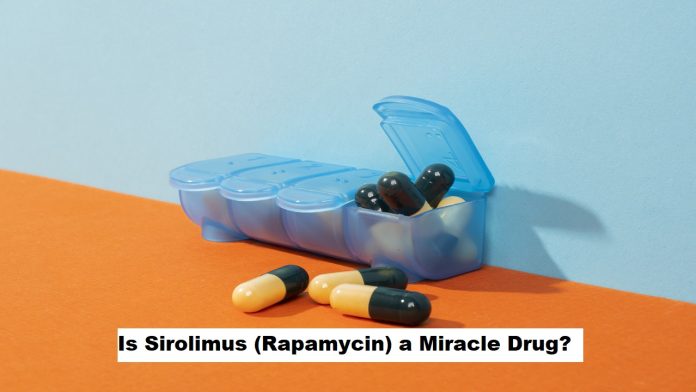It has been a long time since Surendra Sehgal, a microbiologist at Ayerst, discovered this rare compound that he named Rapamycin. He sent a sample to the National Cancer Institute and soon a new class of anticancer drugs was born.
The drug works by blocking mTOR, a protein that is responsible for coordinating an incredibly complex chain of reactions. Each step confirms whether a cell has enough protein, sugar, and energy to divide.
What is Sirolimus (rapamycin)?
Rapamycin is a prescription medication that helps suppress and regulate the immune system. It is used to treat tumor-based cancers, prevent organ rejection in kidney transplant patients, and coat stents that are implanted in heart disease patients.
As the name suggests, rapamycin is derived from a compound found on Rapa Nui (better known as Easter Island). While it is primarily used for cancer treatment and immune suppression in transplant patients, it has promising anti-aging potential.
A new study has shown that rapamycin may promote a longer and healthier lifespan, and researchers think that it works by triggering autophagy, which is a process that cells use to break down and remove nonfunctional or malfunctioning organelles and proteins in the body.
This process is similar to the way caloric restriction (which also triggers autophagy) works. It might sound counterintuitive, but autophagy is actually a pro-survival measure that helps our bodies conserve energy when there is a lack of nutrients.
It is believed that rapamycin increases lifespan by blocking the mTOR pathway, thereby prompting autophagy. mTOR is a protein kinase that plays a key role in regulating the progression of the cell cycle.
Uses of rapamycin
Rapamycin is a drug used to prevent organ rejection after transplant surgery. It also helps treat certain cancers and improves longevity.
Its anti-aging effects are thought to be due to its ability to inhibit a protein called mTOR, which is known to play an important role in aging. Researchers have found that rapamycin prolongs life in mice, yeast, and worms.
In fact, some studies have shown that rapamycin extends the lifespan of mice by over 60 percent! This is amazing, especially considering that most mice die of age-related diseases around 30 months.
Moreover, rapamycin increases the production of collagen, which is necessary for healthy skin. Collagen is an essential protein that gives skin its structure and reduces the appearance of wrinkles and age spots.
Rapamycin is also effective at preventing the development of certain cancers and at improving cardiac function in animals. It can even slow down the progression of type 2 diabetes in mice.
Where to Buy Sirolimus (rapamycin) Online?
It’s an mTOR inhibitor that helps with the aging process by tricking the body into thinking it is in a fasting state, which means it begins to consume the oldest and weakest cells (especially senescent ones). This in turn helps to slow down aging and remove senescent cells from your body.
The drug is often used in organ transplant patients to prevent graft rejection, but it also has been found that low doses of Rapamycin can boost immunity and decrease aging-related diseases in elderly patients.
If you’re looking to Buy Sirolimus, and you’d like to get the best price for it, we encourage you to visit Buy Pharma md. They are a trusted Online pharmacy and provide the lowest prices for this medication on the market.
Why do people take Sirolimus (rapamycin)?
Rapamycin is an FDA-approved drug that prevents your body from rejecting organs and bone marrow transplants. It also helps keep your immune system from destroying cancer cells.
It works by blocking a certain protein called mTOR, which is responsible for geroconversion (increased cell size and function) that occurs in our cells when we age. When mTOR is blocked, the body’s cells are able to clean up their own cells through a process called autophagy.
Research shows that this process reduces the severity of aging by preventing cells from becoming dysfunctional. It also promotes the growth and repair of damaged tissue and slows the aging process overall.
In fact, rapamycin has been shown to increase the lifespan of worms, yeast, flies and mice in low doses. For example, researchers gave a group of 20-month-old mice small doses of the drug for three months and found that they lived an extra two months on average.
However, if you’re looking to take rapamycin for anti-aging, it may take longer than that to see the results. It’s best to talk to your doctor about how much rapamycin you should take and how long it will take before you see any positive changes.
Precaution
Rapamycin is used in low doses for preventing organ rejection in kidney transplant patients and to prevent cancer cells from growing in certain types of tumors. However, it is not approved for any other uses outside of the organ transplant setting.
The drug works by blocking the mammalian target of rapamycin (mTOR), a pathway that plays a role in cell synthesis and metabolism. It also suppresses the immune system in people receiving kidney transplants, so they do not reject the new organ.
It is important to take rapamycin at the same time and in the same way each day. For kidney transplant patients, it is taken orally in a tablet or liquid solution. It can also be given in an IV if necessary.
If you’re taking rapamycin for anti-aging, be sure to read the label and talk to your doctor about any potential side effects. For example, it may not be safe for pregnant women or people who have a sensitivity to rapamycin.

